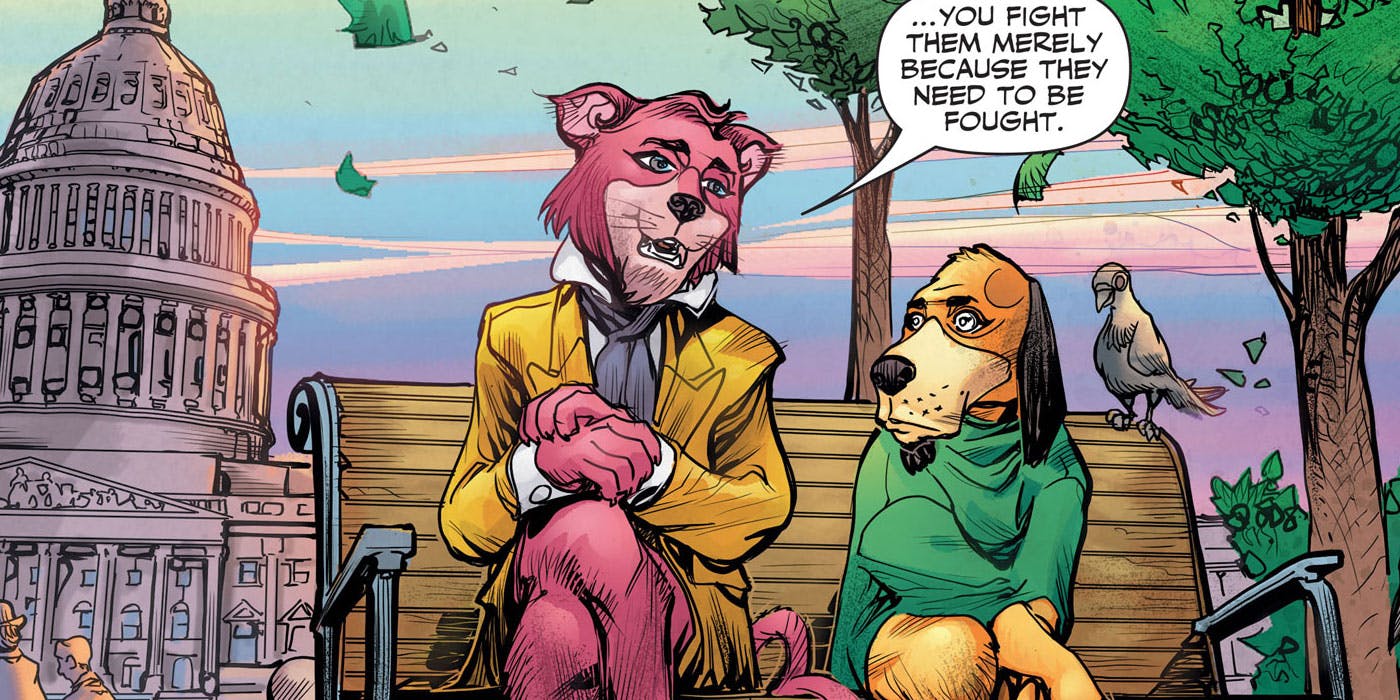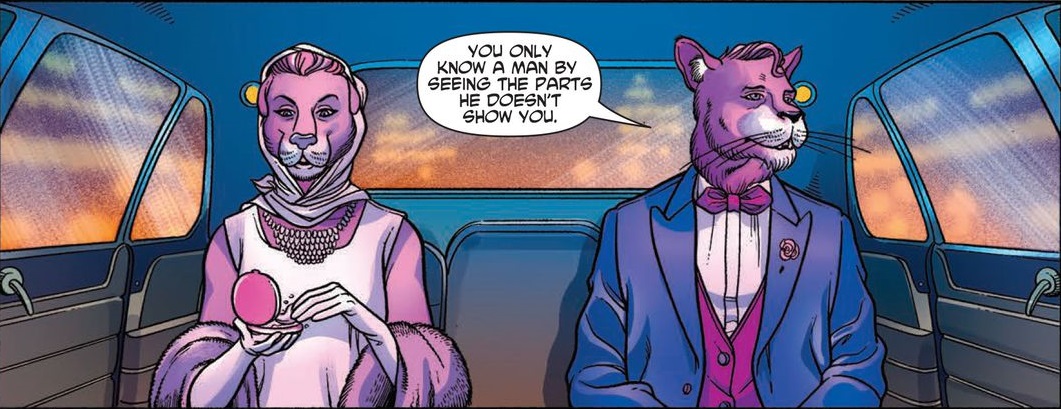Tony Farina from DCN: Congrats on the Eisner nomination for The Flintstones. That is amazing. How did you celebrate? Did you and Steve dress up like Fred and Barney? If not, why not?
Mark Russell: We celebrated with a round of mutually congratulatory e-mails, followed by a nap. Steve and I have no need to dress up, as we both already sort of look like ancient hunter-gatherers.
DCN: Snagglepuss is a bold choice. Was it your choice or did Hanna-Barbera/DC ask you to do it?
MR: I was posting these imaginary dialogues between Snagglepuss and Huckleberry Hound talking like southern gothic playwrights or novelists on Facebook. It was Marie Javins’ idea to turn it into a comic. That’s when I had to start taking the premise more seriously. Thinking about what it would mean to be a closeted man of the letters in America during the 1950’s.
DCN: How did you decide which other members of that universe to include and who to exclude?
MR: When I pitched the idea, I half-expected DC to not take it seriously, or to politely decline. Instead, they asked me if I could work more Hanna-Barbera characters into the story. That’s when I started conceiving of possible roles for other characters. Because he has ten limbs, I thought Squiddly Diddly would make a pretty ideal stage hand. Peter Potamus wears that pith helmet, which seems like the sort of pretentiously ridiculous thing a director might do to let people know he’s in charge. And, because he’s young, Augie Doggie was cast as the young aspiring writer, to whom Snagglepuss is a mentor.

DCN: When you sat down to write it, did you have a vision in mind or did you leave that to Mike? How did he decide who wears pants and who does not?
MR: The pants decisions, I left entirely up to him. Generally, if a visual is really important to me, or if it will come to play later in the story, I will include it in the script. Otherwise, I leave it up to Mike’s discretion and creativity. It’s a strategy which has yet to fail me.
DCN: This book was much less punny than The Flintstones. Was that just because of the sensibility of the book as this is a much more serious story?
MR: Puns are a pretty essential part of The Flintstones. One of the things I liked about the original cartoon were all the places and names they had to tweak to give them a stone age equivalent. So, I capitalized on that. Puns weren’t necessary to Snagglepuss’ world, though. And, yes, because Snagglepuss tells a much darker, more serious story, I wanted the humor and the background details to reflect that.
DCN: Following up on that, how do you decide when to crack a joke and when to let the gravity of the situation linger?
MR: Most of the humor in Snagglepuss is a sort of gallows humor, so if I got a joke, I usually just run with it. In fact, Snagglepuss’ wit is sort of his main defense against the uncaring world in which he finds himself.
DCN: In issue 5, the whole part with the Soviets talking was really funny, but it was not har-har, pull my finger funny. It was only funny to readers who were paying attention to what is happening now and to those who have a bit of historical reference. That is something you do through this whole book. You have an expectation of the reader. Is that risky? Do your editors ever say, “Um…I don’t get it.”?
MR: No. And I think the worst mistake a writer can make is to dumb down their writing in hope of gaining a wider audience. A comic that tries to please everybody will only succeed in pleasing nobody. Any writer can write a mediocre comic designed to appeal to the lowest common denominator, so why aspire to get lost in the shuffle? Write about the things in the world that are fascinating to you as intelligently and passionately as you can. Only then can your readers– who want a unique experience and care about the same things you do– find you.

DCN: Dorothy Parker is one of my heroes. It was nice to see her in this. How did you pick the “real” people you chose to include? Was there anyone you wished you used but didn’t?
MR: I tried to pick people who would naturally fall into Snagglepuss’ orbit as a popular and respected playwright living in 1953 New York. I picked Dorothy Parker because she seemed like a likely role model for Snagglepuss, and I wanted her to have played the same role in Snagglepuss’ life that Snagglepuss later plays in Augie Doggie’s. To show how creative people influence and inspire the next generation. Nobody really creates in a vacuum. We all just contribute what we have to say to the long continuous human conversation called “culture”.
DCN: In my opinion, six issues is not long enough. There is so much story to tell. You could have three more issues just focused on the Stonewall. Why did you stick with such a short run versus a full year like on The Flintstones?
MR: I probably could have used another issue or two to do all the things with this story that I wanted to, but it’s always better for a story to feel like it was too short than too long. If you leave the reader feeling like they wanted more, you did better work than if you left the reader feeling glad that it’s finally over. Also, when you have fewer issues to work with, it forces you to really focus on what’s really important about what you want to say.
DCN: What is next for you? Will we see you stay in the Hanna-Barbera universe, or do you have some other plans inside the greater DC universe?
MR: I’m done with Hanna-Barbera for the foreseeable future, though who knows? I could come back to it at some point. I’ve written a couple of Superman shorts for the Action Comics Specials, which is something I’ve always wanted to do. And I have a couple of bigger projects coming up for DC that haven’t been announced yet, which I’m really excited to be working on.
Well, there you have it, folks! I want to say a sincere thank you to Mark Russell for taking the time to chat with me, and if you haven’t checked out Exit Stage Left: The Snagglepuss Chronicles, do yourself a favor and go read it now!